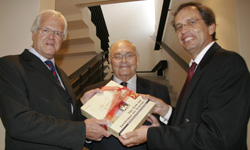Latest News Archive
Please select Category, Year, and then Month to display items
11 January 2021
|
Story André Damons
|
Photo Supplied
 Dr Ralph Clark
Dr Ralph Clark
The Afromontane Research Unit (ARU), the flagship research group of the University of the Free State (UFS) Qwaqwa Campus, has recently been granted R8,4 million to establish a Risk and Vulnerability Science Centre programme.
The Risk and Vulnerability Science Centre (RVSC) programme was established by the Department of Science and Innovation (DSI) as part of the Global Change Research Plan for South Africa and is funded by the DSI through the National Research Foundation (NRF). The RVSC will focus on the need to generate and disseminate knowledge about risk and vulnerability on global change challenges faced by local policy makers/ governance structures and communities in South Africa.
Invited to participate
Dr Ralph Clark, Director of the ARU, says the UFS, together with the University of Zululand and the Sol Plaatje University, has been invited to participate in Phase 2 of the RVSC programme. Dr Clark was approached by the DSI (on referral from the South African Environmental Observation Network – SAEON) in February 2020 regarding the potential for establishing a RVSC at the UFS Qwaqwa campus.
Subsequent interactions were held between the UFS and DSI, and in March 2020, the UFS formally accepted the DSI invitation. It has since been agreed that the RVSC: UFS will be hosted as a RVSC under the ARU umbrella, with dedicated personnel embedded at the UFS in this regard (internal processes and reporting) but reporting directly to the NRF regarding the RVSC.
Interest and support welcomed
Dr Clark welcomed this interest and support from the DSI-NRF, saying that the funds will further assist the UFS in growing its excellent and growing research portfolio and building more research capacity on this traditionally undergraduate-focused campus. “The RVSC will contribute to much-needed solutions in an area marked by major sustainability challenges and will assist in moving Phuthaditjhaba away from its negative apartheid history towards becoming a sustainable African mountain city,” says Dr Clark.
History book available from UFS Marketing
2007-02-01
 The university’s history book, "From Grey to Gold", is available from UFS Marketing.
The university’s history book, "From Grey to Gold", is available from UFS Marketing.
The book will soon be delivered to persons who have ordered copies of the book. UFS Marketing is in the process of distributing the books.
However, persons are also welcome to collect the book from Rinda Duraan or Ronél Meyer at the offices of UFS Marketing in the Wekkie Saayman Building.
Additional copies in Afrikaans or English are also available from UFS Marketing at R380 per copy. Please contact Ronél Meyer at X2150 or Rinda Duraan at X2143 for inquiries.
A proud 100 years
The history of the University of the Free State is one of faith, hope, struggle and determination. In the course of a century, and from a poor Free State community, the UFS has developed into a strong and mature university. This book, richly illustrated with photographs, tells its fascinating story, including:
-
Its establishment
-
The role of the founding fathers
-
Black pioneers of transformation
-
The establishment and development of academic departments and faculties; student numbers
-
Pioneers and trends in research; academic entrepreneurs
-
Campus issues; campus politics
-
The UFS’s place in socio-political changes
-
Student life: Rag, intervarsity and cheerleaders; sport and Springboks; hostel traditions
-
The admission of black students; anguish about race, language and culture
-
The story of “digs” and hostels, of Tin Town and the “Vlei”, Darkest Africa and the Red Square
-
The development of the campus, of the Tickey and the Banana
-
Of hardships in the founding years, good times and turn-around strategies
-
Community service and regional involvement and a new focus on the African continent.
Some interesting reading:
-
More than 500 pages
-
Hundreds of photographs
-
Appendices on office-bearers; awards and achievements (including national sporting colours)
-
A time-line situating the UFS’s history in the context of the history of the Free State, of South Africa and of the world